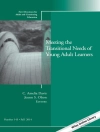This book shows that the introduction of the European Credit Transfer System (ECTS) of credit points as a new accounting unit at universities has led to increased bureaucracy and the schoolmaster-style regimentation of Bachelor’s and Master’s courses. It explains how, due to the pressure of having to plan every single working hour of studying in advance, a ‘Sudoku Effect’ is created by the necessity to combine courses, exams and modules in such a way that the points ‘add up’. An unintentional side effect of the introduction of the ECTS, the Sudoku Effect has led to more classroom style teaching, an inflation of exams and fewer choices available to students. It has resulted in such complex and contradictory guidelines for the planning of the curriculum that the values attributed to the higher education reform can often only be realised if the rules for Bachelor’s and Master’s programmes are ignored, or at least stretched, in practice. The book describes how the reaction to this situation is the continuous further refinement of the complicated rules rather than their abolishment.
Daftar Isi
1. Higher Education Reform and the Resultant increased Complexity – An introduction.- 2. Small Points, Great Effects – On the Introduction of a New Artificial Currency.- 3. The Sudoku Effect – On Degree Arithmetic.- 4. Unwilling Recipients of Spoon-feeding – The Unwanted Side Effects of University Reform.- 5. Escape into Control Deviation.- 6. The Bureaucratic Vicious Circle – The Intensification of the Sudoku Effect through Permanent Reforms.- 7. The Fruitless Search for the ‘Guilty’ – The Reasons why Nobody has to feel Responsible for the Effects of the Bologna Reform.- 8. What to do? Dealing with the Side Effects of the Bologna Reform.
Tentang Penulis
Stefan Kühl is a professor of sociology at Bielefeld University in Germany and works as a management consultant for businesses, administrations, ministries and government development organisations.












